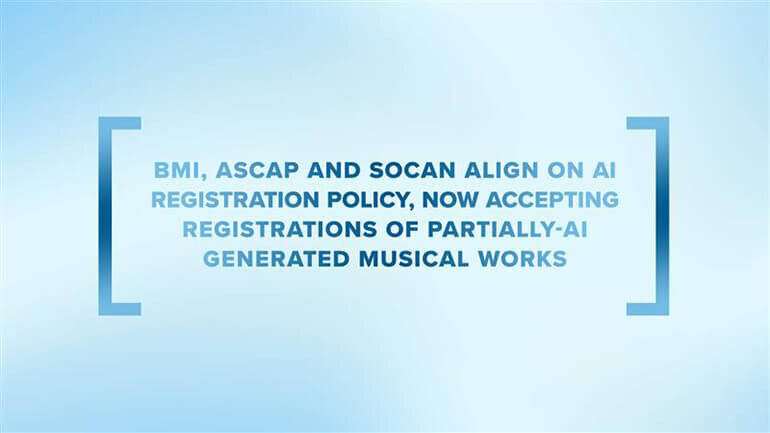ASCAP, BMI, and SOCAN today announced that they have each adopted policies to accept submissions of songs that are partially generated using artificial intelligence (AI) tools. These works can now be registered directly with each organization.
All three PRO registration policies define a partially AI-generated musical work as one that combines elements of AI-generated musical content with elements of human copyrighted work. These works will be included as part of the complete repertoire licensed from each association. Songs created entirely using AI tools are not eligible for registration with organizations.
The policy alignment between the three major North American PROs reflects the fact that songwriters and composers are increasingly incorporating a variety of AI tools into their creative processes and workflows. While a growing number of AI tools train models in ethically responsible ways that respect the rights of human creators, the three PROs emphasized their firm position that it is theft, not fair use, for AI technology companies to incorporate and train models on copyrighted musical works without the permission, compensation, or credit of the creators.
ASCAP, BMI, and SOCAN have advocated for strong copyright enforcement and staunchly defended the rights of music creators during the ongoing debate over AI policy in the United States and Canada. All three PROs have supported meaningful AI legislation, supported lawsuits brought on behalf of music creators against illegal use of their works by AI companies around the world, and provided input into major AI policy initiatives and studies, including those initiated by the U.S. Copyright Office, the White House, the Canadian government, and others.
“Songwriters and composers have always experimented with innovative tools as part of their creative process, and AI is no exception,” said ASCAP CEO Elizabeth Matthews. “We are now making our registration policy clear that we welcome musical works that are partially generated by AI, because we believe that AI can be a powerful tool for our members as long as the law puts humans first and technology companies act fairly and respect the rights of creators.”
“This is an important first step in protecting human creativity as AI technologies evolve, while also supporting songwriters and composers who choose to use AI as a tool to enhance their creative process,” said Mike O’Neill, president and CEO of BMI. “All music creators will benefit from this tailored approach to the registration of partial AI works that properly values creators’ contributions and ensures appropriate payment.”
“This partnership creates a legal and ethical pathway for AI in music,” said Jennifer Brown, CEO of SOCAN. “It recognizes that music creators are embracing new tools, while reinforcing our commitment to what matters most: respecting their work and protecting human creativity.” “The future of music could embrace AI while remaining human.”
More information about each PRO’s AI initiatives, advocacy, and enrollment policies can be found on each PRO’s website.



